At age 12, Sarita Tai (name changed) was married off to a sugar-cane cutter, and by the age of 17 she was already a mother of three kids. By 20, she had her uterus removed, all because the doctor she visited told her she would develop cancer. His solution was simple – she would have to undergo hysterectomy.
Having had no access to education or awareness throughout her life and with three young kids facing an uncertain future without their mother, the decision was easy for Sarita. She claims to have paid Rs. 50,000 for the surgery- although Sarita has no receipts, documents, or even reports from the hospital to suggest any of it had ever happened. This, she again claims, is because the hospital did not provide her any documents.
“What made you go to the doctor, tai?” asked this correspondent. “I was 20 years old. I used to have frequent pain in lower abdomen, backache, heavy bleeding and thick white vaginal discharge,” replied Sarita tai, now a 45-year-old grandmother to two grandsons.
“Was there any improvement after the surgery?”
“No. The bleeding stopped but my body hasn’t gotten rid of other problems. In fact, I have got additional health problems now,” she complained.
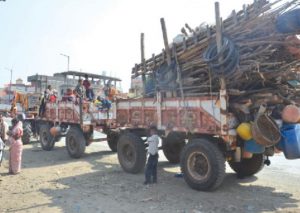 33 years ago, few weeks after her marriage, abject poverty pushed Tai to take up work as a sugar-cane cutter in Beed, Maharashtra. She began migrating with her husband to western Maharashtra and its neighbouring states in search of livelihood in the sugarcane fields. Working at a sugarcane field is extremely laborious and back-breaking, especially for women. On top of it, the 12-16 hour schedule without a single day of leave for months at a stretch, makes live miserable for these women.
33 years ago, few weeks after her marriage, abject poverty pushed Tai to take up work as a sugar-cane cutter in Beed, Maharashtra. She began migrating with her husband to western Maharashtra and its neighbouring states in search of livelihood in the sugarcane fields. Working at a sugarcane field is extremely laborious and back-breaking, especially for women. On top of it, the 12-16 hour schedule without a single day of leave for months at a stretch, makes live miserable for these women.
However, gynaecological issues connected to menstruation are a major hindrance to regular attendance at the sugarcane farms. Absence of even one day from work costs the family heavy penalties, which they cannot afford. This is also one major reason why many women like Sarita, especially from Beed, did not question the doctor’s advice on getting hysterectomies done on them, even without ample tests to confirm their chances of cancer.
Unsurprisingly enough, a look around Beed and a few visits to its hospitals gives one a picture of a malpractice that has engulfed far too many women and left them womb-less.
Take the example of Kaij, a taluka in Beed, where, according to a survey by the Navchetana Sarvangin Vikas Kendra in 2018, 48 per cent of the women within the age group of 12-48 have undergone hysterectomy. Like Sarita, most of these women were advised by their doctors at private hospitals to undergo surgery – all undocumented, as far as providing receipts and reports to the women.
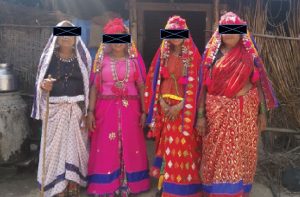 The reporter could personally reach out to over 25 women across Beed, 15 of whom where in Kaij itself. These women shared the same history of hysterectomies done on them – most of them in their 20s when they underwent the surgeries. Although in their 40s, they looked old and frail, with wrinkles on their faces, and physical features typical of 60-plus women. As per a gynaecologist from Halo Medical Foundation, Shubhangi Ahankari, the uterus removal surgery accelerates the process of ageing in women and the body can go through hormonal disbalances.
The reporter could personally reach out to over 25 women across Beed, 15 of whom where in Kaij itself. These women shared the same history of hysterectomies done on them – most of them in their 20s when they underwent the surgeries. Although in their 40s, they looked old and frail, with wrinkles on their faces, and physical features typical of 60-plus women. As per a gynaecologist from Halo Medical Foundation, Shubhangi Ahankari, the uterus removal surgery accelerates the process of ageing in women and the body can go through hormonal disbalances.
While all of these women underwent surgeries to avoid the risk of cancer, they claim their health has only deteriorated over the years. “Even after the operation, our lower abdominal pain didn’t go away. Sometimes, I feel rapid heartbeats, breathlessness, including the bodily weakness. The vision has diminished as happens when one crosses the age of 65,” recounts Savita Bai, 45, (name changed).
Some common health issues could be observed among all these old women such as rapid heartbeats, uneasiness, pain in lower and upper abdomen, in some cases reproductive health problem as they complained. Tehelka corespondent found similar ailments among all these women, which Savita Bai was suffering from. Shubhangi Ahankari claimed that it’s under extreme health situations that the uterus of a young girl is removed. And she said if any woman has the chance of developing cancer or is suffering from prolapse uterine problem or over-bleeding, even then her uterus is only removed between the age of 39 to 49.
Despite outrage, the menace hasn’t stopped
“Madam, I will get my uterus removed this time. The doctor told me I might develop cancer due to heavy bleeding,” says 27-year-old Malti* as she takes a break for lunch with her husband from a sugarcane farm at Beed, Maharashtra.
Malti, who is a mother of two daughters, aged 8 and 12, is planning to undergo uterus removal surgery after she returns to her village in Osmanabad once the sugar-cutting season ends in March this year.
“If I don’t get my uterus removed as soon as possible, I will definitely die of cancer. We are working hard to arrange the money for the operation,” says Malti as she turns to her husband with teary eyes.
Missing a day from work due to periods would also mean a heavy penalty from the Muqadam (contractor), which they can’t afford. On top it, the fear of ‘developing cancer’ due to heavy bleeding during periods looms large over them. “I can’t pay daand (penalty) ever time I take a leave during my period pain. Just three days ago I paid him Rs.1500 daand for taking leave for three days. I was unable to work due to menstrual pain,” Malti continued.
Another woman sugarcane cutter, who would be undergoing the hysterectomy post the sugarcane crushing season, said, “I had undergone checkup for three times, took pills but the problem of white discharge and lower abdominal pain is not improving. The doctors said if I don’t get my uterus removed something critical will happen.”
“Did the doctor tell you what kind of problem you would suffer from?”
“Yes, cancer,” pat came the reply.
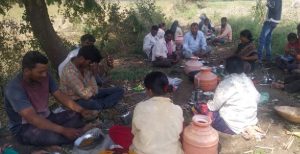 Sitting alongside the farmers, who were lunching together, was the Muqadam. It was a coincidence for this correspondent to meet him. Seeing this journalist, a lady sugarcane cutter in her 30s angrily said, “Madam, look at this man. He is the real culprit behind our huge medical bills. He doesn’t give us leave when we fall sick and instead make us pay penalty.” Reports of these contractors exploiting the labourers using criminal practices has been a trend here for many decades.
Sitting alongside the farmers, who were lunching together, was the Muqadam. It was a coincidence for this correspondent to meet him. Seeing this journalist, a lady sugarcane cutter in her 30s angrily said, “Madam, look at this man. He is the real culprit behind our huge medical bills. He doesn’t give us leave when we fall sick and instead make us pay penalty.” Reports of these contractors exploiting the labourers using criminal practices has been a trend here for many decades.
Challenging manipulation
Doctor is next to God:
A group of women in Vanjawadi village in Beed gave the same narrative that the doctors advised them for the hysterectomy as their uterus had been ‘severely damaged’ and any delay could result in cancer.
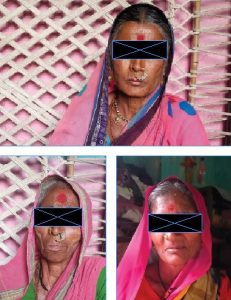
During the interview, many victims confirmed the doctors had told them their uteruses had been damaged and the surgery was inevitable. These doctors even went to the extent of telling them that now since they had multiple children, they no longer needed the uterus, to take a yes from them for the surgery.
In a way, these narratives created by the doctors in the drought-stricken Marathwada region have manipulated poor, rural women living or working there that hysterectomy is the cure for all problems. These women have been conditioned to believe the surgery somehow reduces all gynaecological issues, even period pain.
Despite of there being reports suggesting connections between the doctors and the contractors of the sugarcane farms, and how the doctors, in fact, could have vested interests when they suggest hysterectomies to the labourers, so far no credible action has been taken to punish either of the parties.
Cancer, rumour or real: One of the country’s best cancer research institute, Nargis Dutt Memorial Cancer Hospital is situated in Barshi, Maharashtra. Many rural health camps and cancer detection clinics are set up by the hospital from time to time to screen indicative cases of cancer. Many village women have benefitted from these camps.
The question now is that if so many women from this area had real chances of having cancer, why haven’t the medical professionals reported on any alarming number of cancer-related cases? Why hasn’t an alert been raised on this critical issue? Why was there no investigation over the way these doctors carried out these surgeries? Since the local doctors removed the uteruses of the women for the fear of cancer, did they undertake the precancerous cells examination test before conducting such surgeries, which is mandatory before carrying out a cancer operation? Did the doctors perform medical counselling before and after doing the operation on the patients?
No trust in public hospitals: Surprisingly, majority of the people this reporter spoke to in Marathwada said that they preferred private hospitals over public ones when it came to healthcare. The reasons are same for all. Most of them cannot afford to take leaves on health grounds as it leads to loss of their daily wages. Also, prolonged treatment and drug use means more transportation cost, medication cost, doctor charges, etc. Private hospitals, on the other hand, promises immediate and faster solutions to their health problems. This means that some unscrupulous doctors from these private hospitals take advantage of the patients’ gullibility and instil them with fears of diseases.
Not much action: After many media reports in May 2019 highlighted the malpractices of these doctors and the shocking rate of hysterectomies was revealed, Maharashtra came heavily under the scanner. A seven-member committee was appointed to look into the matter and new directives were released under which private hospitals now have to seek permission to carry out the procedure from either the district civil surgeon or the taluka health officer.
Tehelka spoke to the National Commission for Women (NCW), which claimed it had taken cognisance of the report when it was published last year. The NCW said it had taken up the matter with the Maharashtra government to take strict action in the matter, and also sought the action taken for rehabilitation and mainstreaming of victims of the reported atrocities.
Moreover, there will now be health screening of the women sugarcane labourers before they migrate and after they return from the sugarcane farms.
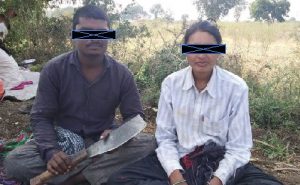 However, when this correspondent spoke with the women labourers on the ground, they denied of any such heath screening being done on them before the migration. There is also zero awareness level among the poor women on the hysterectomy or other gynaecological issues such as cervical cancer, fibroid tumour, vaginal white discharge, heavy bleeding, uterine prolapse, endometriosis, etc.
However, when this correspondent spoke with the women labourers on the ground, they denied of any such heath screening being done on them before the migration. There is also zero awareness level among the poor women on the hysterectomy or other gynaecological issues such as cervical cancer, fibroid tumour, vaginal white discharge, heavy bleeding, uterine prolapse, endometriosis, etc.
The state has also not taken any step for health screening of the women who had undergone hysterectomies in the past. Most women are found to have common ailments such as poor eyesight, cardiac pain, abdominal pain as such.
The figures released by the state show that in three years from 2016 to 2019, some 4,605 women have undergone hysterectomy surgeries in Maharashtra in 99 hospitals. It is also reported that in Beed district, the hysterectomy rate is 14 times more than that for the state or the country. The state health authorities also revealed that they had a record of all the hospitals and doctors who conducted these surgeries in recent years, yet we see no action being taken against them.
Tehelka also witnessed the situation on the ground. The sugarcane farms have no toilets as as result these women defecate in the jungle; no access to clean drinking water, live in makeshift shanties, no creche facilities for toddlers and many more. No arrangement for sanitary napkins and other facilities for women’s needs. Women working in the farm have less awareness on the menstrual and gynaecological issues.
Prajakta Dhulap, BBC Marathi journalist, who had done extensive research on the hysterectomy in Maharashtra, said, “What about the health rights of a woman after pregnancy? There is much focus on pregnancy and safe childbirth in rural but what is missing is the same level of awareness and focus on the women’s reproductive health system from adolescence to age-old. There is no health policy specific to reproductive health system at rural level.”
Human Rights activist Ashok Tangade said, “It is shameful for the state the so many people migrate every year in search of livelihood. The state has failed to provide employment to its own people. If we have to stop such malpractices and exploitation on the poor, we have to first stop migration in the state and to stop the migration in the state we have to bring alternatives to farming in the drought prone areas that produces sustainable jobs.”
Many doctors in these districts have been advising women as young as 20 for uterus removal surgeries on utterly flimsy grounds. They have been selling these surgeries as the panacea of all problems for young women in these areas, and reportedly telling them that the failure to remove the uteruses will heighten the risk of cancer.There are a lot of questions we didn’t find any answers to.
Unanswered questions
Some of the questions that remained answered are: what about the women now who had hysterectomies? Why there is no directive to check on their present health condition? Why have the affected women not been provided with any aid by the state government, despite having severe medical complications?
What about that the action against the erring doctors? Is there a collusion between doctors and the farm contractors? The ground investigation points to a collusion between the doctors and the contractors, why has this nexus not been nipped in the bud?
When there is a clear indication that these labourers lack basic knowledge of menstruation and reproductive, why is the government not initiating mass awareness campaigns in these districts?
Today, the health condition of many women who had already undergone hysterectomy is worsening and there is no state directive to check on their situation.
Q&A
Dr Ashok Thorat, Civil Surgeon, Beed district
Why so many women as young as 20 years old underwent hysterectomy and why?
Frequent vaginal infection due to lack of menstrual and personal hygiene, lack of toilet facility in the sugarcane fields, etc. encompasses factors for undergoing hysterectomy.
Can you assure that all the female sugarcane cutters underwent the health checkups, as the new guideline suggests, before migrating for work?
We have authorised and advised the District Health Officers (DHOs), now it’s upto them to monitor and check on this. I cannot say 100 percent but majority of them have undergone screening Beed.
Why there has been no action against the doctors performing unindicated hysterectomy ?
Our investigation says that all the 5,000 women have full case papers, reports and documents and that they had indicated hysterectomy. Also, while investigating the hospitals we found records which prove they had enough reasons to undertake surgery. We didn’t find any case where it can be proven that doctors used force or threat with patients. Moreover, without substantial evidences in old cases, one cannot challenge that the reason given to the patients was actually genuine or not.
But, why most women were given cancer as the reason behind hysterectomy by most doctors?
Beed don’t have such record.
Then who is spreading the rumour of cancer?
I really don’t know. Not the doctors. There were two levels of enquiry—district level and state level. There was not a single report we can across where force or threat was used by any doctors to make the women go hysterectomy.
There was a rumour by some NGO that women with unindicated hysterectomy would get them compensation of Rs.50,000 from the state government. As a result, in greed of the compensation many women with indicated hysterectomy lied that they had unindicated hysterectomy. Maybe the women you spoke with are the same women who are hoping to encash benefits.
How do you plan to improve the situation?
We are doing health screening in our district to make sure that no unindicated hysterectomy is performed. We have briefed the private practitioners with rules and asked them to go with the medical line of treatment.We have put up compulsory boards of rules on hysterectomy in every private clinic.
What about awareness in village level?
We have anganwadi workers, health workers to assist the locals on ground.
letters@tehelka.com












